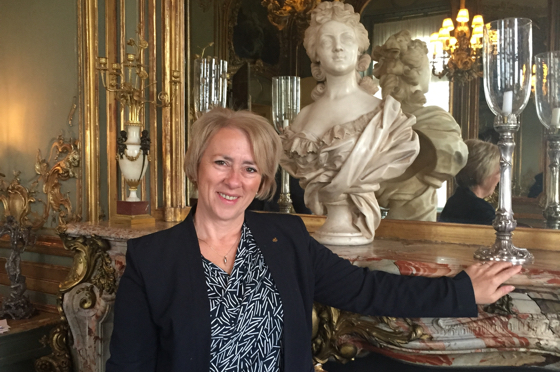Sue Williams is the self-styled keeper of the house at historic Cliveden in England.
“Although my business card says general manager, I have become so passionate about history that I see myself honored to continue tradition,” she said.

In the past the house was in the care of such former Cliveden residents as the Countess of Shrewsbury, whose lover the Duke of Buckingham killed her husband, the Earl of Shrewsbury, in a duel. Much later, American Nancy Langhorne Astor, who became Britain’s first female member of Parliament, also had time to run Cliveden as well as a busy family and social life.
These two exciting figures, and three others, are the subject of “The Mistresses of Cliveden: Three Centuries of Scandal, Power and Intrigue,” published this week (it is by historian Natalie Livingstone, wife of Ian Livingstone, who leases Cliveden privately with his brother Richard and together run London & Regional).
Sue Williams fits admirably into the slot of chatelaine of this unique hotel.
Set on the banks of the River Thames, the 376-acre (152-hectare) Cliveden estate is owned and run by The National Trust. The great house, or stately home, is now the 39-room hotel. “Part of the lease agreement is that we accept prebooked tour groups twice a week,” Williams added. “Daily, there are always at least 60 having afternoon tea in the extraordinary antiques-filled lobby. And there are frequent wedding buyouts and meetings.”
Williams lives on the estate and seems to work seven days a week (a few days ago she was in at 6 a.m. because of a television shoot and three breakfast meetings coming in for full-English two hours later).
“The history of Cliveden has become my passion,” she admitted. Williams researched at nearby Reading University, accessing the Astor papers taken there in 1966 (she found handwritten letters to and from such names as Charlie Chaplin, suffragette Emmeline Pankhurst and the Queen Mother).
Williams subsequently had 10 Reading history students researching onsite, which resulted in a pop-up exhibition in the hotel. “We sold ‘Meet The Archivist’ afternoon teas, and everyone wants more. We may well do another,” she said before rushing off to go on eBay to buy yet more antique crystal glasses to go with filled sherry decanters in all 39 bedrooms.
The biggest thrill Williams gets, however, is seeing visitors coming into the house — sorry, hotel — for the first time. “Their eyes just light up with amazement,” she said.
